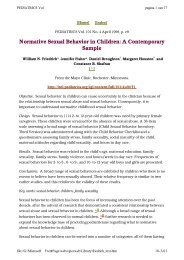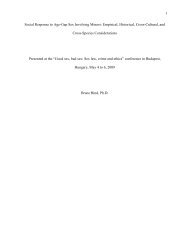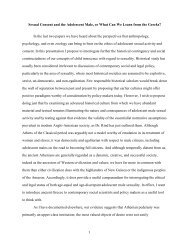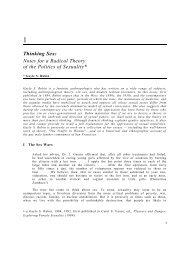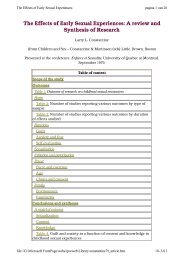PDF file - Ipce
PDF file - Ipce
PDF file - Ipce
Create successful ePaper yourself
Turn your PDF publications into a flip-book with our unique Google optimized e-Paper software.
Part_5_2<br />
However, in this case the grown-up eventually decided the risk was too great and put a stop to<br />
the affair, which is exactly what the ethics of caution would suggest as the correct, moral thing<br />
to do. But Heidi recalls in the clearest possible terms that what she found hurtful was the<br />
rejection. As an adult, she looked back saying she wished that more risk had been taken, not<br />
less. She wished the relationship had become fully sexual.<br />
Up to new ethics?<br />
So do we steer clear of emotional involvement as well? On a consequentialist basis, one might<br />
propose a sliding scale of risk: the greater the risk of a bad ultimate outcome, the more one<br />
should refrain. The greater the hope of a good outcome, the more love and lust can be allowed<br />
to come together -- the more love both adult and child can express and enjoy. But is there ever a<br />
point at which we can absolutely say never? Or should do so? In particular cases, yes, of<br />
course. But not for all.<br />
However, the consequentialist "sliding scale" approach leaves one open to arguments about the<br />
"slippery slope" to perdition. If there are no rules then too much is left to the individual to<br />
decide. Answer: moral rules are for the individual to enforce upon himself. An absolute<br />
standard of socially enforceable laws is available to ensure minimum standards are not<br />
breached. Also guidelines and codes of practice -- of which the Four Principles are an example --<br />
are also a good thing in ensuring that people think carefully and they leave individuals with<br />
little excuse for falling short of socially acceptable standards.<br />
But it is an illusion to suppose even these general standards are very fixed and solid. Society at<br />
large fails even the lifeboat test discussed earlier. I mentioned the deliberate sacrifice of<br />
innocent civilians in war. As recently as last month I see the government of Sri Lanka (which<br />
these days has a very vocal policy against so-called child abuse by Western visitors) was calling<br />
on its citizens to produce more babies, with the specific stated purpose of producing soldiers to<br />
fight in its civil war. Children, in other words, brought into the world specifically to be fed to<br />
machine-guns. But no doubt the Sri Lankan government sees the issue as a matter of life and<br />
death for the entire nation, and it is no easy matter to prove them wrong.<br />
Parents, also, sometimes feel justified in exposing their children to considerable risk. What<br />
about the risk of bringing up a child as a Jew in a society where Jews are oppressed? Should the<br />
parents abandon their faith? Why privilege religion in this regard but not love? Note that the<br />
closer and longer we are in contact with a loved child (the more our investment is like that of a<br />
parent) the more entitled we may feel to "mould" the child -- to educate etc. Indeed the longer<br />
we are close the more this becomes inevitable. Thus we move away from Paul's model of free<br />
negotiation with an "equal" hustler. We can even turn the usual assumption about power<br />
imbalance on its head: it is the parent who has most power vis-à-vis the kid, not the sex tourist.<br />
Negative emotions afterwards<br />
http://home.wanadoo.nl/ipce/newsletters/nl_e_12/part_5_2.htm (10 of 13) [10/16/2002 5:35:14 PM]











